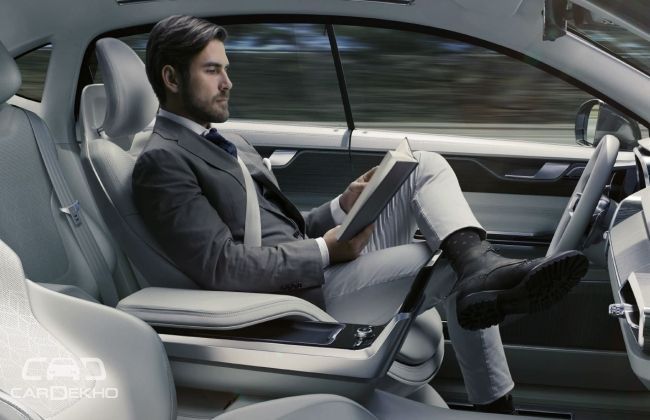Technology Decoded: Driverless / Autonomous Car
ఫిబ్రవరి 24, 2016 05:17 pm sahib ద్వారా సవరించబడింది
- ఒక వ్యాఖ్యను వ్రాయండి

As the name suggests, there is no need of any kind of manual input from driver in order to propel this vehicle. An Autonomous car needs to have a sharp focus on what is going on around it and at the same time it must be quite responsive to handle any kind of situation that may arise. Vehicle and passenger safety is a big factor that rules the destiny of this vehicle concept.
Technology Explained:
Once you start the vehicle and relax back in your seat, vehicle command is overtaken by various technologies linked together in a cooperated way, that is responsible for autonomous functioning of this car. Few of these on-board technologies are: camera, radar system, 360° mapping system, sensors, GPS and a central computer unit. Let us have a look at other insights below:
1. Camera:
It is mounted on car to capture the real time images of surroundings. The feed from camera helps the vehicle to understand surrounding conditions better. Parameters like roadside infrastructure, lane signs, speed limit signs etc. are continuously monitored by camera. Fast image processing is very crucial in order to increase the responsiveness of vehicle.

2. Radar:
Radar system enables our vehicle to actually sense the surroundings by using sensory images. Both short and long range radars are mounted on the car to monitor vehicle’s immediate surroundings and also over long distances respectively to avoid any chances of collision. Radars are mounted on side, front as well as rear portions of vehicle.

3. 3600 Mapping System (LIDAR):
LIDAR is a combination of laser and radar. This system is mounted on top of a car and creates a 3D profile of car’s surroundings. This system is based on measuring time taken by laser/light to bounce back after striking on any surrounding object. It continuously creates a rapid series of the 3600 view around vehicle and relatively compares them and hence is able to detect any movement.

4. Communication System:
This system involves features like exchange of information from vehicle to vehicle (V2V) and vehicle to infrastructure (V2I) and incorporating safety features in order to increase the responsiveness of vehicle to its surroundings and avoid chances of collision. This system also uses Global Positioning System (GPS) which involves satellite communication in order to access the exact location of a car.
5. Sensors:
Various sensors like wheel speed sensor, tyre pressure sensor, throttle sensor, torque sensor, gyroscope sensor, parking sensor etc. are deployed in an autonomous car to control vehicle’s own performance and behaviour on road.
6. Central Computer Unit:
It receives the input from various hardware components like camera, radar, LIDAR, sensors, etc and determines the necessary action needed to be taken like applying brakes, accelerate, take sharp turn etc. This unit directly commands the actuators that actually operates and handles the steering, brakes, throttle, etc.

Watch this video for better understanding of a Self driven car:
Also Read: Technology Decoded: Steering Gear & Types















